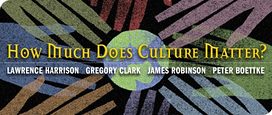Lead Essay
In this month’s information-packed lead essay, Lawrence E. Harrison notes that the role of culture has been badly neglected in serious studies of economic devewlopment. But then, he asks, what explains “why, in multicultural countries where the economic opportunities and incentives are available to all, some ethnic or religious minorities do much better than majority populations?” Harrison reports some results of his recent Culture Matters Research Project, including the finding that “Protestant, Jewish, and Confucian societies do better than Catholic, Islamic, and Orthodox Christian societies…” Harrison provides a number of incisive country case studies, illustrating different ways pre-existing culture can produce economic results, and the ways policy and politics can transform culture.
Response Essays
In his reply to Harrison’s lead essay, University of California, Davis economist Gregory Clark writes, “I simultaneously want to endorse [Harrison’s] promotion of culture, and to run screaming from his lethal embrace.” While agreeing that the failure of purely institutional explanations of historical economic growth “opens the door … for culture,” Clark argues that “attempts to introduce culture into economic discussions so far have been generally either ad hoc, vacuous, blatantly false, or void of testability.” Clark points to great variation in economic performance within cultures and religions, and worries that Harrison’s “measures are not a pure probe into the essence of local cultures, but reflect institutions and economic environments that change the real possibilities for people.”
In his reply to Lawrence Harrison’s lead essay, George Mason University economist Peter J. Boettke argues that it is not culture but institutions—“the rules of the game that govern the way that people interact with one another”—that are the primary determinant of economic growth. However, culture may be crucial, Boettke argues, since it is “a tool for the self-regulation of behavior” that may raise or lower the cost of monitoring and enforcing compliance with “the rules of the game.” And that can make the difference between the success or failure of growth-conducive institutions and policies such as “private property, freedom on contract, limited scope of regulation, monetary restraint, fiscal responsibility, and open trade.”
James A. Robinson of the Harvard University Department of Government argues that Harrison’s measures are insufficient to establish that culture is the x-factor in economic development. For example, Robinson argues that the relative success of certain ethnic and religious minorities may be due to concessions from the majority group, and not the features of the minority culture. Also, Robinson asks, if the economic success of Chinese minorities in other countries is “because they have such a good culture, then why is China one of the world’s poorest countries?” And if Chile’s success lies in its distinctive culture, “then why did it manifest itself so recently?” Robinson concludes that “culture might matter, but doubters like me will not be convinced by the evidence here.”
Related at Cato
» The Role of Culture by William A. Niskanen
» Culture and the Wealth of Nations by Don Lavoie and Emily Chamlee-Wright [pdf]
» Culture, Democracy, and Development by Deepak Lal [pdf]
» Review of David A. Harper, Foundations of Entrepreneurship and Economic Development by Peter J. Boettke [pdf]

